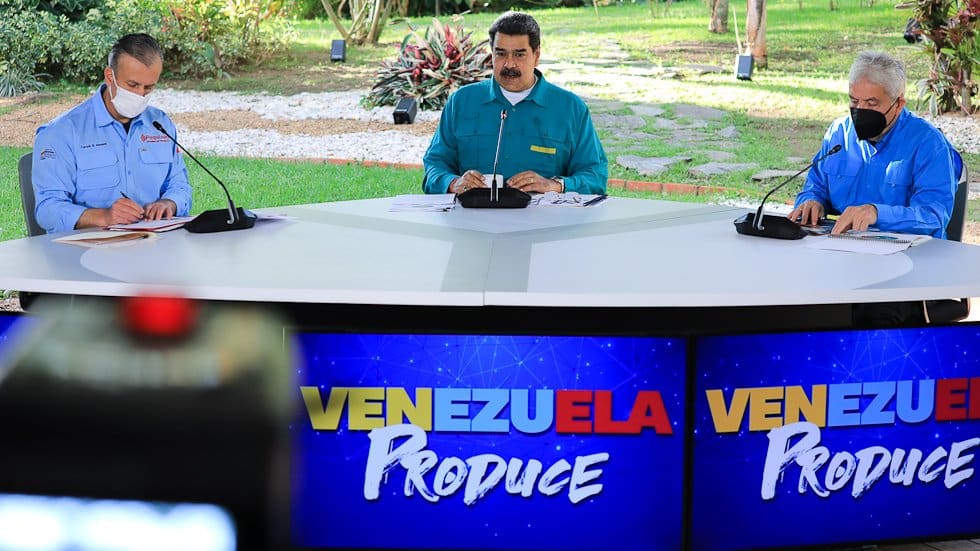
President Nicolás Maduro (center), together with Oil Minister Tareck El Aissami (left) and the minister for agriculture and land, Wilmar Castro Soteldo (right). Photo: Presidential Press.

Orinoco Tribune – News and opinion pieces about Venezuela and beyond
From Venezuela and made by Venezuelan Chavistas

President Nicolás Maduro (center), together with Oil Minister Tareck El Aissami (left) and the minister for agriculture and land, Wilmar Castro Soteldo (right). Photo: Presidential Press.
This Wednesday, August 10, the president of Venezuela, Nicolás Maduro, reported that Venezuela now produces more than 80% of the food it consumes. He highlighted that just a few years ago, 90% of the food being consumed in the country was imported.
“Today I can say that more than 80% of the food that our people consume is Venezuelan,” he explained.
During a working day dedicated to promoting agricultural production, the head of state emphasized that Venezuela will become a food producing and importing power: “We will no longer be dependent on oil nor on anyone.”
“We have a plan, a strategy, we have a scientific method with the nine vertices of the Great AgroVenezuela Mission and Venezuela has been offered foreign investments to come in and transform us into a food producing and exporting power,” Maduro said.
He ratified that from Venezuela, “our food will be produced and we will go on to produce food for the world, in a scheme that we have organized and already offered to at least a dozen countries and investors.”
In order to materialize this great project, Maduro asked for the support of all producers, people, presidents and prime ministers.
RELATED CONTENT: Iran to Grow Food on a Million Hectares in Venezuela
In this sense, he recalled the nine vertices of the Great AgroVenezuela Mission reactivated in 2020 to address all the necessary points for the development and strengthening of agricultural and agro-industrial production in the country:
• Investigation and development
• Territoriality
• Production
• Distribution
• Export
• Financing
• Monitoring and control
• Popular Organization
• Security and defense
He recalled that the first application of the Great AgroVenezuela Mission had good results but was later relegated due to sanctions and later the pandemic. But two years ago, in full confinement due to the coronavirus, work was done to relaunch it, going from six initial vertices to nine, and a process to support producers and campesinos in the Venezuelan countryside began.
“We update, reconfigure and redefine it, and we increased the initial six vertices to nine, studying each issue of the socio-productive process in the countryside, land, agriculture and Pachamama in detail,” summarized the president.
Likewise, President Maduro pointed out that the country had 120 years of an unhealthy economic system, which was dependent on rent from oil. “Today Venezuela is a green country, which is already a productive, prosperous and abundant nation,” he said.
RELATED CONTENT: Venezuela-Iran Food Cooperation Reaches New Heights
“Venezuela had 120 years of an unhealthy capitalistic and economic system, of petrodollars, that was oil-rent dependent and did not allow the development of productive forces, and as a result of the sanctions we have been on the path of economic diversification,” he stressed.
Pequiven has the production capacity to export fertilizers
Pequiven, a subsidiary of PDVSA, was also heavily affected by the sanctions imposed against Venezuela.
In a tweet it was mentioned that, “Tareck El Aissami, Minister of Oil, explains that as a result of the blockade, Pequiven was prohibited from importing catalysts to produce urea for fertilizers. ‘Our scientists managed to replace the components and today we have a full supply for the entire Venezuelan countryside,’ explained El Aissami. Maduro points out that urea is also available for export.”
Tareck El Aissami, ministro de petróleo, explica que, producto del bloqueo, a Pequiven se le prohibió importar catalizadores para producir úrea para los fertilizantes. "Nuestros científicos lograron sustituir los componentes y hoy tenemos el abastecimiento pleno…"
— Luigino Bracci Roa 🔧🚂 (@lubrio) August 10, 2022
Maduro pointed out that after the reopening of the attention center for agro-producers in Barinas, “Venezuela continues to grow in the production of fertilizers, thanks to the efforts of the Pequiven working class, who fully recovered their urea production, including for export.”
In this sense, the president of Pequiven, Pedro Tellechea, highlighted from Alto Barinas the reopening of the attention center where all the products that are going to be provided to the producers are certified. Among them are biocides, herbicides, the new nationally produced fertilizers from the “Ferti” line.
“We have been developing this line by studying the different types of soils, in different states of the national territory, and the result was 14 formulas prepared by our Pequiven scientists, for coffee, oilseeds, bananas and cocoa, among other items,” Tellechea explained.
Likewise, the minister of oil, El Aissami, highlighted that, “these formulas, created as of 2020 with the relaunch of the Great AgroMission Venezuela, developing the apex of agro-inputs, allowed the production of synthetic inputs and fertilizers, which increases the specific yield and allows the soil to be revitalized.”
(Últimas Noticias) by Carlos Eduardo Sanchez with Orinoco Tribune content
Translation: Orinoco Tribune
OT/JRE/DD